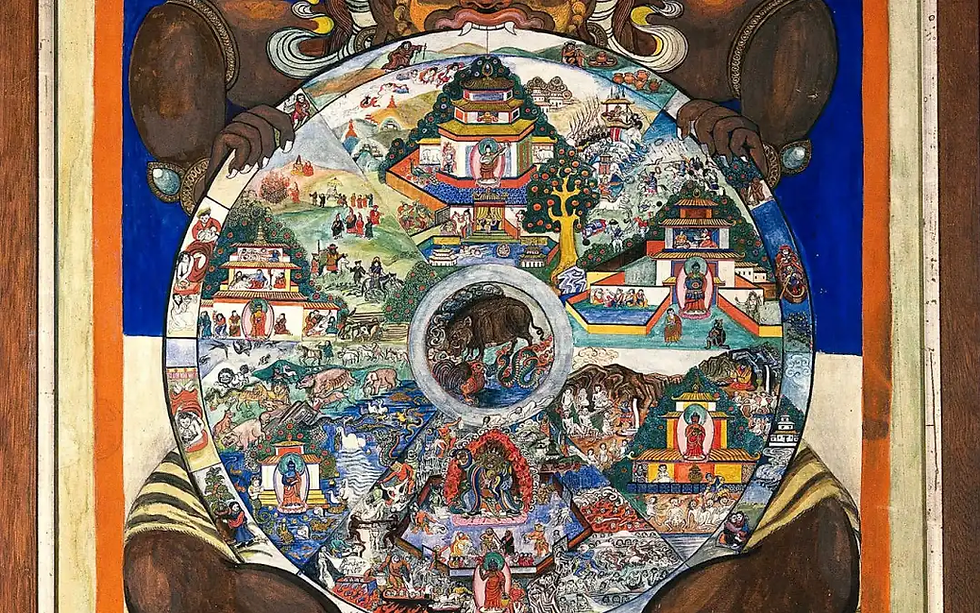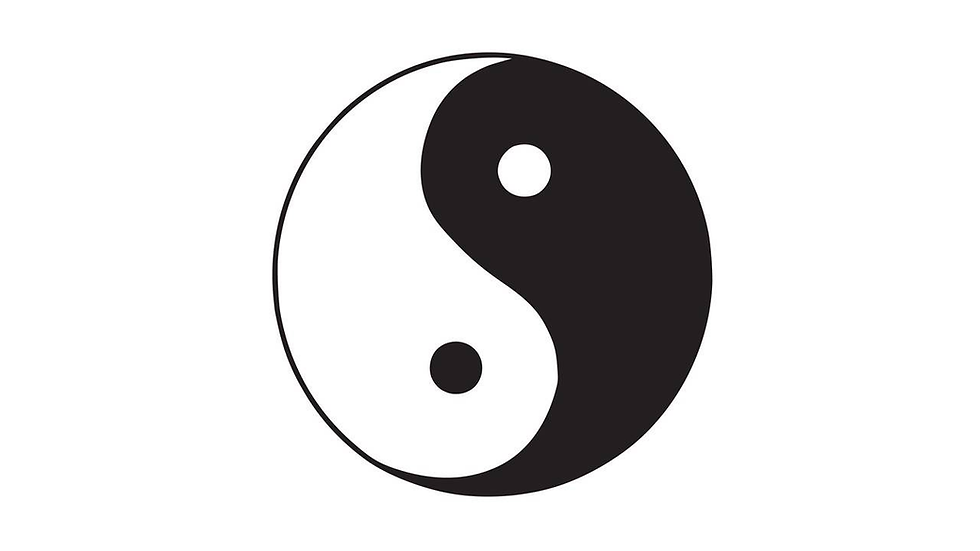Balancing Materialism and Spirituality: A Journey Through Ancient Wisdom and Modern Insights
- Xuande

- Oct 15, 2023
- 11 min read
Who is the Celebrity You Respect the Most?
Right now, trust your first intuition and think of a celebrity you admire the most. While I can't predict everyone's answer, when it comes to celebrities, many of us would likely think of successful entrepreneurs, influencers, or entertainment stars like Elon Musk, Kim Kardashian, or Leonardo DiCaprio. If my prediction doesn't match yours, don't fret. Check if the celebrity you thought of fits these descriptions: wealthy, famous on social media, likely part of the entertainment industry, and often engaging in behavior that entertains the masses.
Now, try to list contemporary thinkers, educators, or philosophers you're familiar with. It's challenging, isn't it? For instance, many of us know of ancient Greek Athenian thinkers like Socrates, Plato, and Aristotle; or ancient Chinese philosophers like Confucius, Zhuangzi, and Laozi; or even more recent ones like John Dewey or Friedrich Fröbel. But where are the thinkers of the 20th and 21st centuries? The answer is, they're probably busy making money or becoming influencers, spreading worthwhile ideas in an entertaining manner. However, few systematically organize their thoughts or challenge prevailing values.

The reason we remember influencers, movie stars, and successful entrepreneurs but don't attribute them with the titles of thinkers, sociologists, educators, or philosophers is that our society hasn't experienced a significant shift in values for a long time. In the past 200 years, the era has been dominated by capitalism. Through the benefits of the Industrial Revolution and wars, the Anglo-Saxon world, led by the United States, spread values that prioritize profit, money, materialism, and fame via movies, music, news, and social media, making everyone aim for wealth, fame, and material enjoyment as ultimate life goals.
"Behind actions often lie our fundamental assumptions about life," a quote I deeply resonate with, comes from Awesome Me - the Psychology behind Self-Discovery by Haixian Chen. And behind our blind pursuit of the aforementioned things lies a profound assumption about life. This assumption is so pervasive and accepted that few dare challenge it — the notion that human life is finite, and death marks its end. The subsequent logic is straightforward: due to our finite lives, we opt for material and monetary pursuits because they indeed offer our physical selves endless comfort. Thus, endorsing a value system centered around capitalism and materialism becomes taken for granted.
But, is this really the case? Is our existence limited solely to the death of our physical bodies? Does the soul exist? What is the purpose of my current life? When you begin to ponder this "profound assumption," a slew of questions that science can't definitively answer emerges.
The Dangers of Extreme Capitalist Values
Before we delve into this almost unprovable issue, I'd like to discuss the harm extreme capitalist values inflict upon people.
To start, let's consider a relatable example: As a soon-to-be college graduate, many of my friends are looking for internships. The most frequently mentioned criterion is the salary package. We can't help but admire programmers who've secured return offers from major tech firms or investment banking analysts entering the financial sector, because they earn a lot. For a newcomer, an annual package could often reach hundreds of thousands of dollars. My good friend Eric is one of these envied graduates.
However, after working for a renowned investment bank in Hong Kong for three months, Eric began to question the "real value" of his profession. To fulfill his duties, he often works more than 20 hours a day, which means he gets less than 4 hours of sleep. His routine is to return home at 3 am, sleep at 4 am, and be at the office before 9 am. You might wonder if the physical toll became unbearable. Indeed, that's a point many fear about investment banking. For instance, Eric once told me he fainted en route to the restroom after two sleepless days and had a brief nap beside the toilet just to continue working. Yet, as a driven young individual, Eric wasn't afraid of the physical demands.
What truly troubled him was the time his job consumed, preventing him, someone who cherishes life's finer moments, from making a trip to Costco to buy premium A5 steak and savor the joy of pan-searing it in butter. The stark conflict between societal values that prioritize high-paying jobs and his personal preferences and hobbies made Eric reevaluate his choices. Hearing his story, I found myself pondering what initially drove Eric to choose a career in Investment Banking, which clearly wasn't a good fit for his personality.
Like Eric, there are countless others. They are the bright university students society pins its hopes on, endowed with exceptional vision and capability. Yet, their choices often get swayed by an underlying set of values. If one deviates from societal expectations, they may face misunderstanding from parents, disdain from peers, or even abandonment from partners. Because subconsciously, we equate more money with a better life, more respect, and higher social status.

However, when we look at supremely successful individuals, they often find success inadvertently while doing what they love. They don't see their efforts as laborious but genuinely enjoy working long hours or engaging in their passion.
From my perspective, the pitfalls of extreme capitalism are evident: it robs individuals of the chance to genuinely understand themselves and explore their inner desires. It sets a straightforward, quantifiable, and seemingly achievable goal that subtly influences our decisions. When our outcomes diverge from this singular objective, anguish follows.
Alongside comes the solidification of social hierarchies and extreme behaviors. It's simple: the rich get richer and the poor get poorer. So, if wealth is a resource held by a minority, those aspiring to climb this ladder might forsake moral principles and dignity to amass even more wealth. Even if they've achieved financial freedom, their desires don't wane because there's always someone richer up the ladder.
This mindset benefits the privileged, hence the top 1% wish to propagate it widely. It's evident in superhero movies where the protagonist, embracing individual heroism, eventually gains wealth, fame, societal status, and recognition. However, such ideology hardly fosters individual happiness in society.
Capitalism's Detriment to the World: Monopoly, Media, and War
Certainly, the harms of extreme capitalism emerge on a larger, global scale. Let's delve into capital monopoly, news media, and warfare. Following the ongoing conflict between Russia and Ukraine, another has already ignited between Palestine and Israel. Amidst this brutal war, thousands, including civilians, have been injured or killed. In this discussion, we won't pick sides but merely observe media trends, revealing an intriguing fact: "free" Western media seem to be less accepting of diverse voices than the “strictly controlled” Chinese media.
For instance, on short-video platforms TikTok and Douyin, the U.S. government urgently notified TikTok's CEO, Shou Zi Chew, granting him 24 hours to address misinformation about the Israel-Palestine conflict created by content makers on the platform. Yet, why wasn’t a similar warning given to platforms under Facebook? Because on TikTok, you can find diverse voices, while on Facebook, there's predominantly one. As media monopolists, they allow only voices aligning with their interests, rather than a true dialogue.

An interesting incident also recently occurred within Harvard University's student organizations. Many student groups initially condemned Israel for its alleged massacre, attacks on ambulances, and neglect of humanitarian principles. Yet, after receiving some "warnings and threats" from unknown sources, almost all these organizations shifted their stance in favor of Israel.
Personally, I perceive a direct correlation between media control and the extremism of capitalism. Those with vested interests need to brainwash society, endorsing a singular worldview, and suppressing challengers. Almost all U.S., and even European media, are controlled by specific wealthy groups. If you investigate the top news organizations in the U.S., regardless of being left or right-leaning, you might often encounter two common corporate names: The Vanguard Group and Black Rock. This indicates that information is essentially held by a minority. Even apparent debates and their outcomes are strictly regulated. This phenomenon isn’t restricted to news organizations. When you examine tech giants like Google or Facebook, or leading movie companies, you'll find these corporations as major stakeholders. Ironically, the U.S., emblematic of freedom, might just be one of the least free nations. When you rise to the top, you either join them or plummet. In such an environment, most of us would probably opt for the former.
So, the pinnacle of extreme capitalism culminates in one ultimate result — monopoly and control. The monopolists offer an illusion of diversity by creating various brands, voices, and values. They make society appear pluralistic. However, subtly, through media channels influencing our subconscious — like social networks, films, music, books — they surreptitiously implant the values they genuinely wish the world to accept. Thus, unbeknownst to us, they control everyone's thoughts.

In the book Thiaoouba Prophecy, Michel, who is "abducted" by extraterrestrials and forced to receive the truth, mentions that aliens believe only two things are genuinely destroying human society leading us towards extinction: money and media. I resonate with this perspective. Especially after closely analyzing the symbolism in many movies and music and comparing past media works, one can sense a radical shift in our values over the past 20 years. Concurrently, human behavior follows suit.
Soul, Reincarnation, and Purpose - Christianity, Buddhism, Taoism, I Ching, and Gaming
I believe the key to addressing the issue isn't necessarily how we should view money or how the media should disseminate information. Once such assertions gain traction, they'll be quashed by certain individuals. We need only prove one thing to unsettle them: life is eternal.
If society began to widely acknowledge this, behaviors would naturally decelerate. As ideas of the soul, reincarnation, and purpose permeate discourse—regardless of actual acceptance—I think more people would grasp that life's meaning extends beyond materialistic pleasures.
Before attempting to prove this, I must express a concern. The scientific method itself is somewhat extremist. From a young age, we're taught to only accept outcomes that can be proven and derived. Unproven theories are deemed likely wrong or erroneous. Only verified concepts are propagated. Such a mindset primarily serves vested interests since they can manipulate the process of verification, rejecting all theories lacking substantial evidence. Thus, proving questions like "Does death mean the end of everything?" is unachievable in scientific terms, but that doesn't mean other disciplines lack potential supporting evidence. I'll provide some references.
Contemplating whether "life is eternal", we can perhaps find indirect evidence from the following domains: religion, gaming, and first contact (alien encounters).
Be it Buddhism, Christianity, or Taoism, all touch upon the concept of reincarnation. Using varying narratives and languages, set against different cultural backdrops, they convey the same truth: Beyond the physical, something imperishable and cyclical persists. Many spiritual practices aim to break free from this system, echoing a desire to liberate the soul from endless cycles.

Buddhism speaks of the Six Realms: Three of virtue - heavenly, asura, and human; and three of vice - hell, animal, and hungry ghost realms. Christianity, at its core, has the concepts of Heaven and Hell, which address human purpose, consequences of sin, and God's grace. Revelations 21:4 describes a paradise without pain, sorrow, or death, while Revelations 20:15 portrays the Lake of Fire as eternal separation from God—a portrayal of Hell. Taoism elegantly encapsulates the opposing dynamics and cycle of life using the Yin and Yang concept. The doctrine indicates a mutual interdependence (each containing an element of the other), transformative nature, and their unity. Viewing birth as the commencement of Yang, according to the theory, leads to its transformation into Yin, culminating in death. This is followed by a transition from Yin back to Yang, symbolizing the cycle from death to rebirth.

Interestingly, all religions identify two opposing forces, neither three nor four. Their logical interpretations are remarkably consistent, suggesting: 1. Death isn't the end. Be it the Six Realms, Heaven and Hell, or Yin and Yang interaction, they all imply continued activity after death, possibly in a spiritual or ionized form. 2. Humanity is ensnared in a cyclical system that "allocates" post-death outcomes. 3. There's a higher power that records, judges, and determines one's afterlife fate. In Buddhism, this is the cyclic system; in Christianity, it's God; and in Taoism, it's the "Heavenly Way." Why do teachings from distinct cultural and religious backgrounds converge on these fundamental principles? Perhaps there's a singular truth, narrated differently by various cultures.
If these observations don't pique your curiosity, consider the analogy of video games. For a game designer, foundational aspects of a successful game include world-building and system design. The essence is a set of player-triggered reactions coded by programmers. To players, two aspects are evident: The game's backend mechanics remain hidden, and every player decision is constantly logged. Doesn't this reflect the ongoing cycle of life and the concealed logic of reincarnation?

Lastly, let's venture into extraterrestrial encounters to complete our narrative. I've come across two intriguing books: "Chronicles from the Future - Paul Amadeus Dienach" and "Thiaoouba Prophecy - Michel Desmarquet." The former recounts Paul's unconscious soul's journey to the year 3900, while the latter describes Michel's space journey with aliens revealing the "true universe." Both books concur on the distinct separation of body and soul. Advanced species prioritize soul evolution. In "Chronicles from the Future", Paul's depiction of the future portrays a society valuing shared knowledge, eradicating monopolies and capitalist values, leaning more towards communism or socialism. Their pursuit lies in intellectual breakthroughs. In "Thiaoouba Prophecy," Michel witnesses reincarnation technology, observing various past lives, reinforcing his belief in reincarnation and the soul's significance.
The Path of Balance - Material vs. Spirit; Science vs. Mysticism
Why does capitalism inevitably lead to destruction, and why are we at a pivotal juncture? I believe it's because the underlying logic of capitalism is extreme. The common denominator at the heart of all wars in recent human history, perceived disasters, and events with negative impacts, is an insatiable desire for material goods and money. Our era overlooks many things, such as valuing material possessions over spiritual growth; prioritizing science and neglecting the advancements in mysticism; focusing on wealth and disregarding our inner feelings. We need to move away from these extremes and embrace balance.
This equilibrium closely aligns with the philosophy of "moderation" and even the state of "non-action". As Laozi said, "Act without action and nothing is left undone". This means embracing life's meaning by following its natural course. It doesn't mean doing nothing but rather, throughout our growth, defining our worldview, values, and morals. By bridging the gap between our actions and theoretical knowledge, we reduce external influences and amplify inner motivation.

What values should our society promote to ensure happiness for every individual?
In modern China, there's a discipline called "Yi Learning", and its foundational text is called "Yijing" or "I Ching". Practitioners study the intricate relationships between heaven, earth, and humans through health practices, traditional Chinese medicine, personal destiny predictions, observing the external appearances of heaven, earth, and man, and predicting events and future trends. After a basic study of the book "The True Decipher of Ziping" - by Xiaozhan Shen, many enthusiasts and I reached a consensus: Humans have a preordained destiny, implying one's life course can be seen and precisely predicted. From birth to life's conclusion, it's as if a game's backend program runs its course and can be inspected.
Therefore, one's purpose, strengths, and true destiny become crucial. When these don't align with worldly values—say, someone meant to pursue the arts decides to start a business for profit—pain and conflict arise. They might eventually find their true calling in the arts and complete their life's journey. However, if from the outset we don't adopt these universal values, but instead believe everyone should pursue their unique value, society's happiness quotient would rise.
In closing, I hope each of us harbors an "imaginary adversary" in our minds to help distinguish between the life we genuinely desire and the values society tries to impose on us. Let passion, intuition, and going with the flow be our guiding principles. Given time, within our lifetimes, a society and set of values that bring greater happiness to all will emerge.
Citations
Chen, Haixian. "了不起的我 - 自我发展的心理学" (Awesome Me - the Psychology behind Self-Discovery).
The Holy Bible.
Shurangama Sutra.
Laozi. Tao Te Ching.
I Ching.
Shen, Xiaozhan. "子平真诠" (The True Decipher of Ziping).
Xu, Ziping. "渊海子平" (The Profound Ocean of Fate Study).
Lv, Dongbin. "太乙金华宗旨" (Secret of the Golden Flower).
Dienach, Paul Amadeus. Chronicles from the Future.
Desmarquet, Michel. Thiaoouba Prophecy.
"[Israel-Palestine war: Harvard students face backlash over statement blaming Israel for violence]." Middle East Eye, [October 11, 2023], www.middleeasteye.net/news/israel-palestine-war-harvard-students-face-backlash-statement-blaming-israel-violence.
"Europe gives TikTok CEO 24 hours to respond about Israel-Hamas war misinformation." CNBC, [October 12, 2023], www.cnbc.com/2023/10/12/europe-gives-tiktok-24-hours-to-respond-about-israel-hamas-war-misinformation.html.



Comments